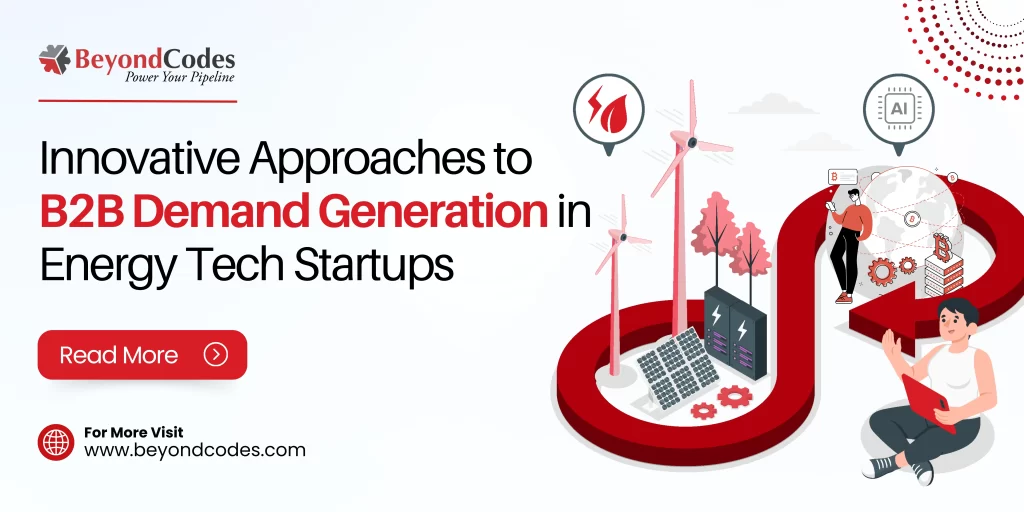Let’s face it—energy tech startups aren’t just selling products. They’re selling change.
From clean energy breakthroughs to efficiency-boosting technologies, the impact potential is massive—but only if the right businesses are aware of it. And that’s where demand generation comes in.
In today’s overcrowded market, where inboxes are crammed with generic pitches and decision-makers are tougher to reach, your startup needs more than just visibility. You need to spark conversations, build credibility, and nurture high-intent prospects through a longer, more complex B2B sales cycle.
This blog explores demand generation strategies tailored specifically for energy tech startups—practical, data-backed, and built to convert. From thought leadership to account-based marketing and data-driven outreach, we’ll show how to connect with the key decision-makers and turn interest into long-term partnerships.
What is B2B Demand Generation in the Energy Tech Industry?
In simple terms, B2B demand generation is all about sparking interest in your energy solutions among businesses—whether it’s large manufacturers, utility providers, or government agencies. The objective is not only to attract leads. It’s also about educating, engaging, and building trust through a strategic sales process with organizations that have specific energy goals.
For energy tech startups, demand generation requires a combination of traditional marketing techniques and more cutting-edge strategies. These startups often deal with complex, high-tech solutions that require significant customer education. It’s essential to adopt a demand generation approach that addresses these complexities while focusing on customer pain points such as energy efficiency, cost savings, and regulatory compliance.
Key Elements of B2B Demand Generation
Before diving into the strategies, it’s important to understand the key elements that form the foundation of a successful B2B demand generation campaign for energy tech startups:
- Targeted Audience Segmentation: Identifying the right prospects is critical. Energy tech startups should tailor their efforts to specific industries or decision-makers, such as facility managers, procurement teams, or sustainability officers at large corporations or government entities.
- Clear Value Proposition: The value proposition must clearly articulate how your energy tech product or service addresses real business problems. Whether it’s improving energy efficiency, reducing operational costs, or enabling compliance with energy regulations, prospects must understand the tangible benefits your solution provides.
- Content Strategy and Education: Content marketing is the cornerstone of demand generation. Startups should provide educational content that helps decision-makers understand the technology, its benefits, and how it solves their specific challenges.
- Lead Nurturing: Nurturing leads through the sales funnel is especially crucial in the B2B energy tech space due to longer sales cycles. Regular touchpoints, educational content, and personalized communication are key to keeping prospects engaged until they are ready to convert.
Innovative Approaches to B2B Demand Generation
Now that we’ve outlined the key elements, let’s explore some innovative and highly effective strategies that energy tech startups can implement for successful B2B demand generation.
1. Thought Leadership and Industry Expertise
Positioning your energy tech startup as a thought leader in the industry is one of the most effective ways to build trust with potential clients and generate demand. Thought leadership involves sharing valuable insights, expertise, and research about the energy sector, its challenges, and the innovations shaping its future.
Tactics for Thought Leadership:
- Blogging and Articles: Write in-depth blog posts and articles on trending energy topics like sustainability, renewable energy solutions, or the future of energy tech. Providing insights into the latest research or regulatory updates will attract business decision-makers seeking credible sources of information.
- White Papers and Case Studies: Produce comprehensive white papers that explore industry issues or the technical details behind your solutions. These long-form pieces offer in-depth insights that demonstrate your expertise and build credibility among decision-makers.
- Guest Contributions: Contribute articles or reports to industry journals, websites, and publications. By publishing content in recognized venues, you expand your reach and connect with a more targeted, high-intent audience.
Click Here:- Personalization at Scale: How B2B Lead Gen Agencies Drive Retail Success with Targeted Campaigns
Establishing thought leadership enables energy tech startups to build brand credibility and position themselves as industry experts who can help other businesses address complex energy challenges.
2. Webinars and Virtual Events
Webinars and virtual events are powerful tools for engaging a B2B audience and creating demand for energy tech products. These events enable startups to deliver value by educating prospects about their solutions while also demonstrating their expertise and capabilities.
Benefits of Webinars and Virtual Events:
- Live Demos: Hosting live product demos is an effective way to demonstrate to potential clients how your solution works in real-time. This interactive format can address specific questions, overcome objections, and build trust in the product’s effectiveness.
- Industry Panels: Host or participate in panel discussions with other energy experts, where you can debate industry challenges and offer insights. This establishes your company as a go-to resource in the field.
- Case Studies and Success Stories: Use webinars to present successful case studies and real-world examples of how your product has improved energy efficiency or helped businesses meet regulatory goals. This allows prospective clients to visualize the impact of your solutions on their operations.
Webinars and virtual events also provide opportunities for direct interaction with potential clients, which increases engagement and the likelihood of conversion.
3. Account-Based Marketing (ABM)
Account Based Marketing (ABM) is an increasingly popular strategy for B2B demand generation that targets high-value accounts with highly personalized marketing campaigns. For energy tech startups, ABM can be particularly effective as it allows them to focus their efforts on large corporations or government organizations that have specific energy needs.
ABM Strategies for Energy Tech Startups:
- Identify High-Value Accounts: Start by identifying key accounts within your target industries that would benefit from your energy tech solutions. This could include large manufacturers, utility companies, or municipalities.
- Personalized Outreach: Once you’ve identified target accounts, craft personalized messaging that speaks directly to the company’s energy challenges and how your product or service can solve them. This could include personalized emails, custom landing pages, or targeted ads.
- Sales and Marketing Alignment: ABM requires close collaboration between sales and marketing teams. Marketing needs to create content tailored to specific accounts, while sales teams must follow up with personalized outreach and facilitate a seamless transition into the sales process.
4. Data-Driven Marketing for Precision Targeting
In today’s digital world, data is one of the most valuable assets for B2B demand generation. By leveraging data, energy tech startups can fine-tune their demand generation strategies, segment their audience more precisely, and ensure that they’re reaching the right people at the right time.
How to Use Data-Driven Marketing:
- Lead Scoring: Leverage data to score leads based on their behavior, such as the frequency of their website visits, engagement with your content, or interaction with your email campaigns. Lead scoring helps prioritize high-intent leads and ensures that you’re focusing on prospects who are most likely to convert.
- Audience Segmentation: Utilize data to segment your audience by industry, company size, geographical location, and energy requirements. Tailored messaging ensures that your content resonates with each segment, improving engagement and conversion rates.
- Continuous Optimization: Monitor the performance of your campaigns using analytics tools and make adjustments based on the data. A/B testing, analyzing click-through rates, and tracking conversions help optimize marketing strategies over time.
5. Partnerships and Strategic Collaborations
Strategic partnerships and collaborations can significantly amplify demand generation efforts for energy tech startups. By partnering with other businesses, technology providers, or industry associations, startups can reach new audiences and increase their market influence.
Partnership Opportunities:
- Co-Marketing Initiatives: Partner with other businesses to create co-branded content, joint webinars, or trade show appearances. By combining resources, both companies can amplify their reach and target new customer segments.
- Referral Programs: Set up referral programs with partners who can introduce your product to potential clients. Offering incentives for successful referrals encourages collaboration and generates high-quality leads.
- Integration Partnerships: Work with other technology providers to integrate your solutions into their existing offerings. This can make your product more attractive to clients already using complementary technologies.
6. Video Marketing and Product Demos
Video marketing is a particularly effective strategy for energy tech startups, as it enables them to explain complex products and technical concepts in a digestible format. Videos allow startups to demonstrate how their solutions work and the value they provide in real-world applications.
Types of Videos for Demand Generation:
- Explainer Videos: Short videos that explain the problem your product solves and how it works can make complex solutions more accessible to potential clients.
- Product Demos: Showcase your product in action by highlighting its features and real-world benefits. Demonstrating how your technology integrates into existing systems can help prospects see the practical value.
- Customer Testimonials: Videos featuring satisfied clients discussing how your product helped them solve energy challenges can be highly persuasive for new prospects.
By leveraging video marketing, energy tech startups can engage prospects, effectively explain their products, and build trust with potential clients.
Conclusion
Are you doing enough to power your pipeline in today’s fast-evolving energy tech market?
Success isn’t just about visibility—it’s about becoming a trusted advisor to the organizations you want to serve. When energy tech startups align their messaging with real-world energy goals and adopt focused strategies like ABM, thought leadership, and data-backed outreach, they don’t just generate leads—they spark lasting demand.
Ready to energize your sales funnel with smarter demand generation?
Author
-
With 7+ years of experience and a background in media & communication, she brings stories to life that fuel lead generation success. She transforms complex B2B ideas into content that is clear, engaging, and results-driven—helping key decision-makers take action. A good cup of coffee fuels her writing ideas, and when off the clock, she enjoys unwinding with her dog by her side.








